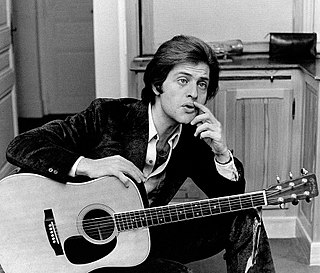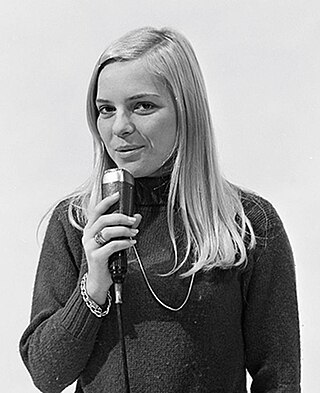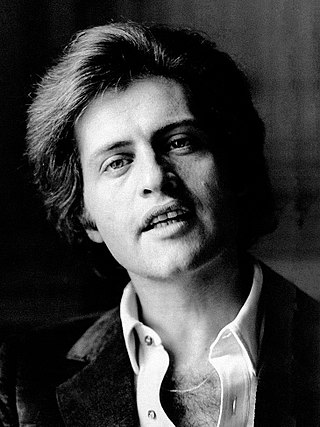
Joseph Ira Dassin was an American–French singer-songwriter. In his career spanning sixteen years (1964–1980), he enjoyed numerous successes in France and the French-speaking world, as well as singing in languages other than French. He had a career in Finland, Greece, and Germany. In total, he sold nearly 25 million records worldwide. He was the son of film director Jules Dassin.

Isabelle Geneviève Marie Anne Gall, known professionally as France Gall, was a French yé-yé singer. In 1965, at the age of 17, she won the tenth edition of the Eurovision Song Contest with the song "Poupée de cire, poupée de son", representing Luxembourg. Later in her career, she became known for her work with singer-songwriter Michel Berger, whom she married in 1976. Her most successful singles include "Résiste", "Ella, elle l'a" and "Évidemment".

Daniel Rozoum (20 May 1959 – 28 February 2013), known as Daniel Darc, was a French singer, who achieved success with his band Taxi Girl between 1978 and 1986, and also as a solo artist.

Les Breastfeeders are a Canadian francophone rock 'n' roll band from Montreal, Quebec.
This is a discography for Joe Dassin.
"L'Été indien" is a 1975 single by American-French singer Joe Dassin. In the song he reflects with fond memories of his lover, whom he met during an indian summer, but with whom he has now lost contact.
"Et si tu n'existais pas" is a 1975 song by Joe Dassin. It is the first track of his album Joe Dassin . The lyrics are by Pierre Delanoë and Claude Lemesle, the music is by Salvatore Cutugno and Pasquale Losito. The song was covered by Iggy Pop in 2012.

"Les Champs-Élysées" is a 1969 song by the American-French singer Joe Dassin. It is a French-language cover of "Waterloo Road", a single released the previous year by the English rock band Jason Crest.
"Ça va pas changer le monde" is a song by Joe Dassin from his 1975 album Joe Dassin .
"Il était une fois nous deux" is a song by Joe Dassin from his 1976 album Le Jardin du Luxembourg.

"Non illuderti mai" is a song by Italian singer Orietta Berti, released as a single in April 1968 for the summer festival Un disco per l'estate. The song came in second place at the festival behind "Luglio" by Riccardo Del Turco. It has notably been covered in English as "My Little Lady" by the Tremeloes and in French as "Ma bonne étoile" by Joe Dassin.

Le Jardin du Luxembourg is the 10th studio album by French singer Joe Dassin. It came out in 1976 on CBS Disques.

Joe Dassin is the fourth French studio album by Joe Dassin. It came out in 1970 on CBS Disques.

Joe Dassin is the ninth French studio album by Joe Dassin. It came out in 1975 on CBS Disques.

Joe Dassin is the third studio album by French musician Joe Dassin. It was originally released in 1969 on the CBS Disques label.
"Luglio" ('July') is a 1968 song by Riccardo Del Turco. The song won the Un disco per l'estate competition and was awarded the Golden Gondola at the Mostra internazionale di musica leggera, marking the breakout of Del Turco, and becoming his signature song. The single sold over 500,000 copies.
Le Jardin du Luxembourg is a song by Joe Dassin. It was the first track of side 1 of his 1976 album Le Jardin du Luxembourg. The female vocals are by Dominique Poulain.
Salut is a song performed by Joe Dassin from his 1975 album Joe Dassin .

Les Femmes de ma vie is the 11th French studio album by Joe Dassin. It came out in 1978 on CBS Disques.

Dans les yeux d'Émilie is a song by Joe Dassin from his 1978 album Les Femmes de ma vie. It was also released as a single in 1977, with "Maria" on the other side.












